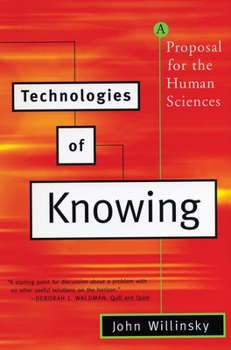Technologies of Knowing: A Proposal for the Human Sciences
Select Format
Select Condition 
Book Overview
In this age of ever more powerful computers, our ability to collect and spread knowledge is growing at an exponential rate. Far from liberating humanity, our "information exasperation", as John Willinsky describes it in this pathbreaking book, has made our ability to reach conclusions about the world around us all the more difficult. With little order to guide us through the mountains of new information in the Internet, the public, as well the sciences that have amassed such knowledge, has little confidence in its potential to change the world for the better. For example, the overload of conflicting new findings in breast cancer research has so paralyzed progress that some researchers now recommend that women stop examining themselves to avoid the psychological burden of monthly searches for this deadly disease.While some critics have condemned computers and the Internet for putting us in this age of overflow and still others have praised them for their own sake, Willinsky takes a middle ground. Using the fictitious Automata Data Corporation as the vehicle for an ingenious thought experiment, he plays out what would happen if all information collected from social science research were centralized, catalogued, and processed by one company serving the public interest. Willinsky describes in great detail how such an entity could work to fulfill the promises of the human sciences and technology. Sure to stir debate, Technologies of Knowing offers a starting point from which to rethink our understanding of our emerging "wired" world and adds new insight into how to make the uses of knowledge more democratic.
Format:Paperback
Language:English
ISBN:0807061077
ISBN13:9780807061077
Release Date:February 2000
Publisher:Beacon Press
Length:224 Pages
Weight:0.72 lbs.
Dimensions:0.7" x 6.0" x 9.0"
Related Subjects
Computers Computers & Technology Engineering Social Science Social Sciences TechnologyCustomer Reviews
2 ratings
Social science research as knowledge economy
Published by Thriftbooks.com User , 25 years ago
This witty and well-written book is a mix of intellectual argument, journalistic adventure, and philosophical reasoning (it leads to the Kantian Enlightenment Test, p.135). Technologies of Knowing presents a proposal for getting better value out of our investment in social science research. Now there's an idea whose time has come, I thought, given what we "invest" in this research (the author estimates $3-4 billion annually is spent through our universities and publicly-funded agencies, with what might be inadequate cost/benefit validation!!!). This book suggests that it's not e-commerce, or even e-services, but e-sense where this knowledge economy really comes of age. Willinsky proposes a model, a fictional Automata Data Corporation, that would make more sense, more access, more understanding of the methods and results of extensive social science research in health, education and other (high cost) areas of public interest. The author proposes using currently available internet, database and data mining technologies to "pull out" more meaning from research, and then more effectively apply this knowledge to addressing social issues through the participation of a more informed public. Willinsky uses many easy-to-relate-to examples from the social sciences (such as the debate about phonics versus whole-language approaches to the teaching of reading in our schools) to demonstrate how public access to the actual research behind these divergent views and positions would help us make better individual and societal choices. I am intrigued by this model of Information Age democracy, more sophisticated and valuable than the oft-uninformed Town Hall internet discussions currently in vogue, used by politicians to gauge public perceptions but often lacking in carefully-considered and researched ideas. After reading this book, I am inclined to think that an even better use of technology (after selling books, of course) might be to connect social science research to that public it purports to serve, improving the public value of all that knowledge. We have the technologies to better organize and make available complex information. Getting on with it would deliver a price-earnings multiple that might add up to better shareholder value for all of us who pay for social science research and should benefit from it, living as we do in a rather complex world.
a very necessary project
Published by Thriftbooks.com User , 26 years ago
I enjoyed the book. Yet what impressed most was the need a public service which would have the independence necessary to provide a real online community where not only all the research were shared but also an intellectual freedom to make use of all this knowledge. The book points to the importance of research. It may not always help us as persons or a society. However, it can be used for very politcal aims. Therefore, if it it was made available in an honest fashion, at least everyone could have the chance of responding. More and more centers of media and research is controlled by a small group.The general needs such a service more than ever. However, the reality it otherwise. This could a costly affair if properly done. How many people would actually use it? Our society reads less and is becoming more polarized.The book does not address the political problem behind all this. The disputes are exposed a very santiized in the book. It would have been appropriate to mention the slow control of Internet and all mass media by a small group of people. It is easy to make fun as many do, not this author, of liberals who failed at going any REAL GOOD for society. There may be a danger of society going backwards to times when a large group was ostracized by a dangerous minorty.Perhaps my concerns of not having the full picture may have been covered ino other books by the author. It seems that the public debate is filled with too many neo-conservative thinkers who always bash liberalism, welfare and socialism while hiding the dark realities of our society. It is a worthwhile read. My own Webby existence makes me daily see the need for a true AUTOMATA DATA.






